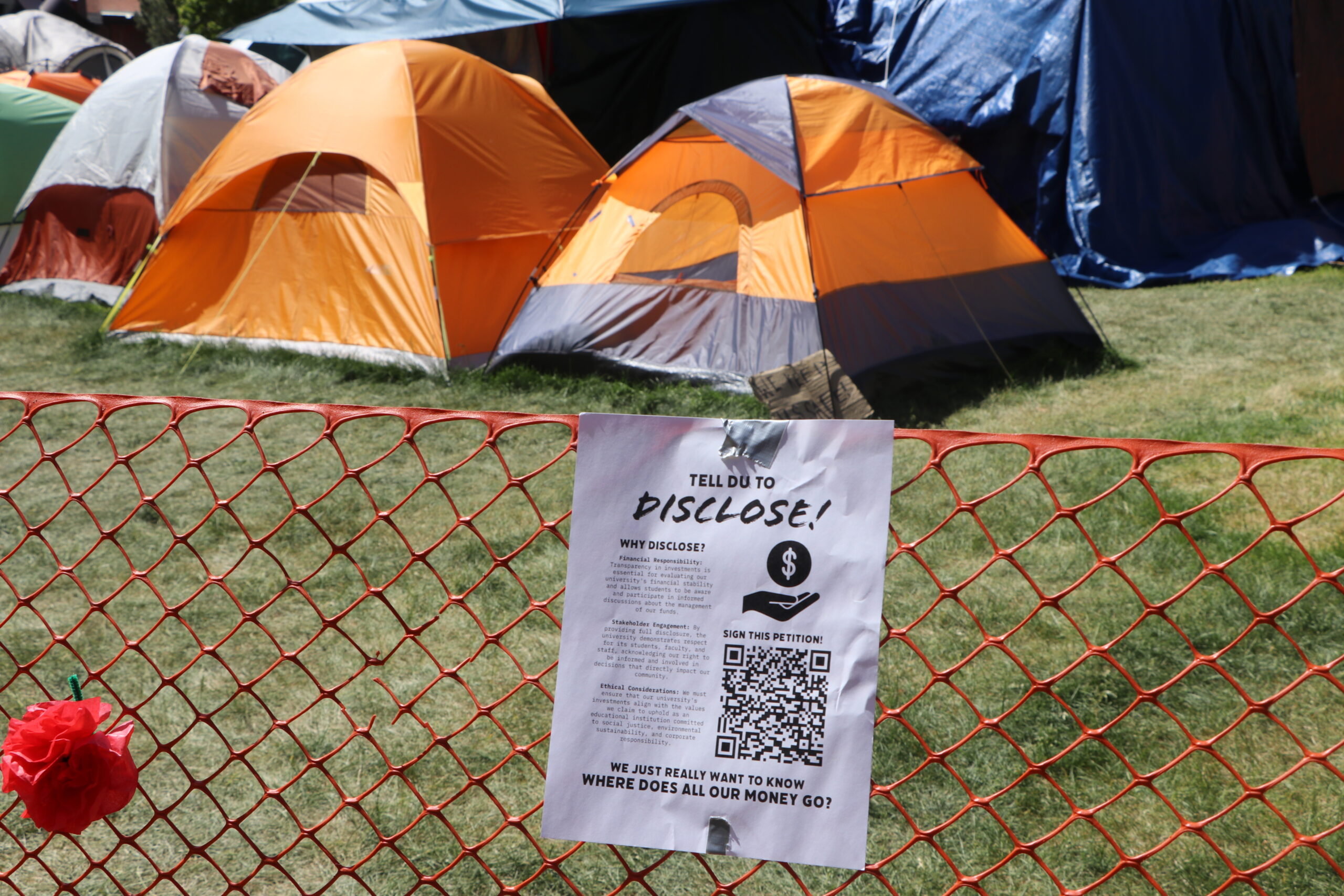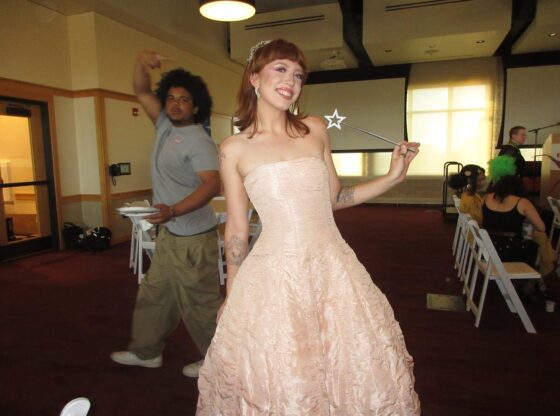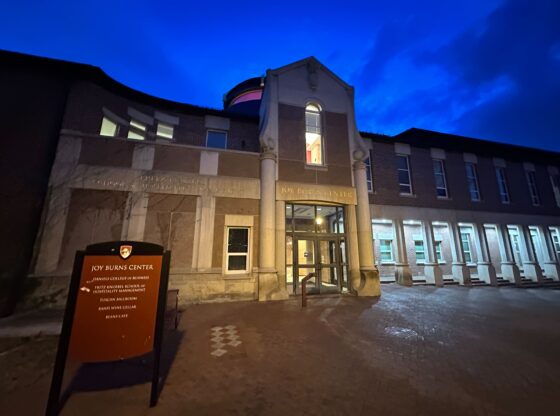As the pro-Palestine encampment enters its third week on Carnegie Green, the chants led by organizers have become a key element. The chants intend to foster solidarity and amplify the participants’ voices, but for the Jewish community, they provoke feelings of hurt and isolation.
JoJo Carranza, a DU4Palestine organizer, discussed the importance of the chants and their intentionality.
“The time when we use the chants the most are when we are gathered together. We specifically try to hold rallies every day. We use the word ‘rallies’ because it implies a coming together of community and connection with one another. It’s rallying together, rallying in community, rallying energy [and] rallying purpose,” said Carranza.
When asked what three chants are the most popular, they said that two that are shared by all chant leaders are “free, free Palestine,” and “disclose, divest, we will not stop, we will not rest.” The third chant varies depending on the organizer.
For Carranza, “free, free Palestine,” does not focus on the politics surrounding the Middle East Crisis or a potential solution to the conflict, but rather focuses on envisioning a future that calls for the liberation of Palestinians.
“I think what it’s focusing on is not Palestine as a state, rather Palestine as a people and as a culture. I think what that chant is calling out is the oppression, the apartheid, the genocide, [and] the land theft and lack of sovereignty Palestinians have in the land that they are indigenous to. It is a call and reminder for everything we are doing at this encampment, the movements worldwide [and] not just calling for a ceasefire or an end to the genocide, but for the liberation of Palestinians in whatever form that takes,” said Carranza.
A Hillel student representative also spoke on the significance of some of the popular chants at DU’s encampment. For “free, free Palestine,” their thoughts semi-align with Carranza.
“I interpret this as a call to free the people in Gaza. Sometimes, this chant splinters into calls for freedom and social justice for other people in the world who are not yet free. I don’t hear it as harmful, and I agree with the message. I want freedom, peace and justice for everyone,” they said.
The “disclose, divest, we will not stop, we will not rest,” chant highlights key demands shared by all encampments. At DU, two of the five demands are that the institution discloses their Israeli investments, both financial and academic, as well as divest from those investments. The final portion demonstrates the protestors’ determination to achieve these goals.
“There are endless conversations to be had and endless problems to be solved from camp operations, to meetings with the Chancellor [and] to media posts… One of the things that can happen in a lot of that is being de-centered from why we are all organizing and what we are here for. Engaging in this chant helps me personally, and I think it helps others, recenter in the why… It’s a recentering and grounding feeling,” said Carranza.
The Hillel student representative shared their thoughts on the chant for disclosure, which differs from Carranza’s interpretation.
“My understanding of the Boycott, Divestment and Sanctions, BDS, campaign is that the goal is to punish Israel with the potential to cause a collapse of their economy, leading to further chaos rather than steps towards peace. I want the Palestinian people and the Jewish Israeli people to co-exist. I don’t think BDS is the answer, and, like many other chants, I think it’s divisive,” they shared.
For Carranza, their third top chant is “from Palestine to Mexico, these border walls have got to go. From Palestine to the Philippines, end the U.S. war machine.” This chant holds significant meaning for them. Carranza’s father was born in Mexico and immigrated to the United States as a child. This specific chant allows Carranza the opportunity to personally connect with the encampment.
“The U.S.-Mexico border wall has done a lot of harm to a lot of different people. For me and my family specifically, it is a symbol of colonialism, U.S. imperialism, white supremacy, and as I recenter this to Palestine, I see the walls that exist in Palestine and Israel to keep certain people out of specific places based upon their ethnic background… As I connect my own family’s history to what I am seeing across the world, I get filled with a sense of solidarity and connection to Palestinians and the border walls that are imposed on them. It creates that personal connection between myself and them,” said Carranza.
The final portion of the chant serves as a connection to the injustices that occur across the world.
“[The chant] is going to a completely different side of the world but still draws a connection between the plight of Palestine to the violence experienced in the Philippines, all the way back here to the U.S. that is a source of a lot of the imperialism and violence… I think the chant connects us, this relatively small encampment of the DU community, to the global struggle for collective liberation… that in itself is very inspiring and empowering and reinvigorating because it’s not just us. It’s us and the folks at Auraria and the folks at Columbia and all around the world,” said Carranza.
On many college campuses, some of the most common chants are “disclose, divest…” and “free, free Palestine,” as well as “from the river to the sea, Palestine will be free. From the sea to the river, Palestine will live forever.” The latter has seldom been heard on campus since the walkout in support of Auraria was held on April 30.
According to Carranza, the chant’s absence has been intentional, given its history and meaning that alludes to anti-semitism. Which DU4Palestine and the DU encampment have a zero-tolerance policy for.
“We have chosen not to use that chant in any frequent or significant ways. What we found from the rally that DU4Palestine put on earlier in the year was that it decentered the conversation from what we were really asking and advocating for, to a conversation of if we were calling for anti-semitism and other forms of violence. Which we are not… we are here specifically to talk to administration about disclosing and divesting and to advocate that the university push forward a future towards a free Palestine… and so getting caught up in a conversation about a chant or what a solution for the conflict will be, is not the purpose of this encampment right now,” said Carranza.
The Hillel student representative is a grandchild of a Holocaust survivor, and spoke on the complicated history between the Jewish and Muslim communities and the hurt that is felt when chants like “from the river to the sea,” are said.
“Jews and Muslims have been in the land of Israel since before the Kingdom of Judea. Many Jewish prayers long for the return to this land. The idea of Zionism, the right to Jewish self-determination in the land of Israel, was created to ensure safety for my people after the Holocaust. The history is complicated, and one of the painful realities is that Zionism was a tragedy for the Muslim people of Palestine. This is painful for me and many Jews and why some Jews may struggle to differentiate our Jewish identities from the land of Israel,” they said.
Zionism’s complexity is a significant part of the broader conversations on the Israeli-Palestinian conflict and Jewish identity.
“I want to dream of what a free Palestine can look like, but when I hear chants like ‘from the river to the sea,’ I hear a call for the elimination of my family and friends who live between the Jordan River and the Mediterranean Sea in the land that we call Israel. This scares me. Words matter, and expressions mean different things to different people. If you chant, ‘from the river to the sea,’ with the purpose of eliminating Israel as a Jewish state, then you are saying one people, Jews, among all people in the world do not have a right to have a country in their historic homeland – that is anti-semitic. If your call is to share the land between Israelis and Palestinians, I am with you, but the statement itself is never clear,” they said.
When asked for any final or parting words, the Hillel student representative shared their thoughts on what they perceived to be the attitude of the protestors.
“One thing that troubles me overall is the feeling that the protestors are blaming Israel for everything and not acknowledging that Hamas launched a catastrophic terror assault and uses their own people as human shields. If the encampment was focused on peace, their chants would include freeing the hostages, stopping the ward and replacing the Hamas terror organization. If they were, I would chant with them… I often feel that the attitude of the protestors leans into blaming American Jews for Israel’s right-wing government. I don’t support everything an American president does; am I responsible for their actions?”
While Carranza used the opportunity to emphasize the open invitation the encampment has for any community member to learn more.
“One of the things that we are trying to prioritize here at this camp is community — safety and inclusion of the community. So for anyone who is engaging with this interview, curious about the encampment, curious about getting involved in a rally, [there] is an open invitation to come join. This is not an exclusive club, this is not an exclusive space. This is a space where we want to posture social connection, education and welcome anyone who wants to participate,” said Carranza.
The open invitation has reached many members within the DU community and has been taken on by the Hillel student representative.
“I’ve been at the encampment a couple of times to see my friends and in an effort to understand different perspectives. Most of the time it has felt fine. It’s great to see my peers caring about what’s going on in the world and speaking up about this one issue. Other times, I feel intimidated, threatened, and othered from more aggressive and hateful rhetoric coming from people who I think are grad students. I also feel very uncomfortable when counter-protesters respond with similar hostility,” they said.
As the pro-Palestine encampment continues, the significance of chants remains at its core. These expressions not only mobilize support and solidarity, but also the emotions and histories of those involved. For encampment organizers, the chants symbolize resistance and a call for justice. At the same time, members of the Jewish community may interpret these chants through a lens of historical trauma.
At the current state, it is evident that dialogue and mutual understanding are crucial. Words can both heal and harm, unite and divide. Acknowledging this and the impact of chants can hopefully lead to creating a space where diverse voices can be heard and coexist.








